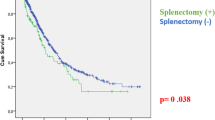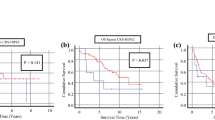Abstract
Background
Complete cytoreductive surgery with hyperthermic intraperitoneal chemotherapy (CRS + HIPEC) is increasingly performed on patients with peritoneal carcinomatosis of various origins. Splenectomy often is required in these patients to achieve complete tumor removal. Although splenectomy has been associated with increased morbidity in many major abdominal surgeries, its effect in patients undergoing CRS + HIPEC is unknown. The purpose of this study was to evaluate the impact of splenectomy during CRS + HIPEC on postoperative outcomes.
Methods
We retrospectively identified 39 patients who underwent CRS + HIPEC with splenectomy during a 3-year study period from a prospective database. We compared them to case controls (CRS + HIPEC without splenectomy) that were matched for the complexity of the procedure. We evaluated the complication rate and outcomes of patients in each group.
Results
During the study period, splenectomy was performed in 32 % of patients undergoing CRS + HIPEC procedure. Patients in the splenectomy group experienced more grade 3–4 complications than patients in the control group (59 vs. 35.9 %, p = 0.041) as well as more pulmonary complications (41 vs. 7.7 %, p = 0.0006). Multivariate analysis identified splenectomy as the only predictor of overall major complications (odds ratio = 2.57, 95 % confidence interval = 1.03–6.40). Mortality was similar in both groups.
Conclusions
Splenectomy increases major complication rate in patients undergoing CRS + HIPEC and efforts should be made to preserve the spleen during the surgery.

Similar content being viewed by others
References
Glehen O, Gilly FN, Boutitie F, et al. Toward curative treatment of peritoneal carcinomatosis from nonovarian origin by cytoreductive surgery combined with perioperative intraperitoneal chemotherapy. Cancer. 2010;116(24):5608–18. doi:10.1002/cncr.25356.
Chua TC, Moran BJ, Sugarbaker PH, et al. Early- and long-term outcome data of patients with pseudomyxoma peritonei from appendiceal origin treated by a strategy of cytoreductive surgery and hyperthermic intraperitoneal chemotherapy. J Clin Oncol. 2012;30(20):2449–56. doi:10.1200/JCO.2011.39.7166.
Sugarbaker PH, Ryan DP. Cytoreductive surgery plus hyperthermic perioperative chemotherapy to treat peritoneal metastases from colorectal cancer: standard of care or an experimental approach? Lancet Oncol. 2012;13(8):e362–9. doi:10.1016/S1470-2045(12)70210-3.
Yan TD, Deraco M, Baratti D, et al. Cytoreductive surgery and hyperthermic intraperitoneal chemotherapy for malignant peritoneal mesothelioma: multi-institutional experience. J Clin Oncol. 2009;27(36):6237–42. doi:10.1200/JCO.2009.23.9640.
Chua TC, Yan TD, Saxena A, Morris DL. Should the treatment of peritoneal carcinomatosis by cytoreductive surgery and hyperthermic intraperitoneal chemotherapy still be regarded as a highly morbid procedure? A systematic review of morbidity and mortality. Ann Surg. 2009;249(6):900–7. doi:10.1097/SLA.0b013e3181a45d86.
Baratti D, Kusamura S, Mingrone E, Balestra MR, Laterza B, Deraco M. Identification of a subgroup of patients at highest risk for complications after surgical cytoreduction and hyperthermic intraperitoneal chemotherapy. Ann Surg. 2012;256(2):334–41. doi:10.1097/SLA.0b013e31825704e3.
Eaton MA, Valentine J, Jackson MR, Modrall G, Clagett P. Incidental splenic injury during abdominal vascular surgery: a case-controlled analysis. ACS. 2000;190(1):58–64.
Mettke R, Schmidt A, Wolff S, et al. Spleen injuries during colorectal carcinoma surgery. Effect on the early postoperative result. Chirurg. 2012;83(9):809–14. doi:10.1007/s00104-012-2277-y.
Wakeman CJ, Dobbs BR, Frizelle FA, et al. The impact of splenectomy on outcome after resection for colorectal cancer: a multicenter, nested, paired cohort study. Dis Colon Rectum. 2008;51(2):213–7. doi:10.1007/s10350-007-9139-6.
Kristinsson SY, Gridley G, Hoover RN, Check D, Landgren O. Long-term risks after splenectomy among 8,149 cancer-free American veterans: a cohort study with up to 27 years follow-up. Haematologica. 2014;99(2):392–8. doi:10.3324/haematol.2013.092460.
Gilly FN, Carry PY, Sayag AC, et al. Regional chemotherapy (with mitomycin C) and intra-operative hyperthermia for digestive cancers with peritoneal carcinomatosis. Hepatogastroenterology. 1994;41(2):124–9.
Aminian A, Mirsharifi R, Karimian F, et al. Influence of splenectomy on morbidity of esophageal cancer surgery. Scand J Surg. 2010;99(1):9–13.
Galizia G, Lieto E, De Vita F, et al. Modified versus standard D2 lymphadenectomy in total gastrectomy for nonjunctional gastric carcinoma with lymph node metastasis. Surgery. 2015;157(2):285–96. doi:10.1016/j.surg.2014.09.012.
Glehen O, Osinsky D, Cotte E, et al. Intraperitoneal chemohyperthermia using a closed abdominal procedure and cytoreductive surgery for the treatment of peritoneal carcinomatosis: morbidity and mortality analysis of 216 consecutive procedures. Ann Surg Oncol. 2003;10(8):863–9. doi:10.1245/aso.2003.01.018.
Disclosure
The authors have no conflict of interest to declare.
Author information
Authors and Affiliations
Corresponding author
Rights and permissions
About this article
Cite this article
Dagbert, F., Thievenaz, R., Decullier, E. et al. Splenectomy Increases Postoperative Complications Following Cytoreductive Surgery and Hyperthermic Intraperitoneal Chemotherapy. Ann Surg Oncol 23, 1980–1985 (2016). https://doi.org/10.1245/s10434-016-5147-x
Received:
Published:
Issue Date:
DOI: https://doi.org/10.1245/s10434-016-5147-x




